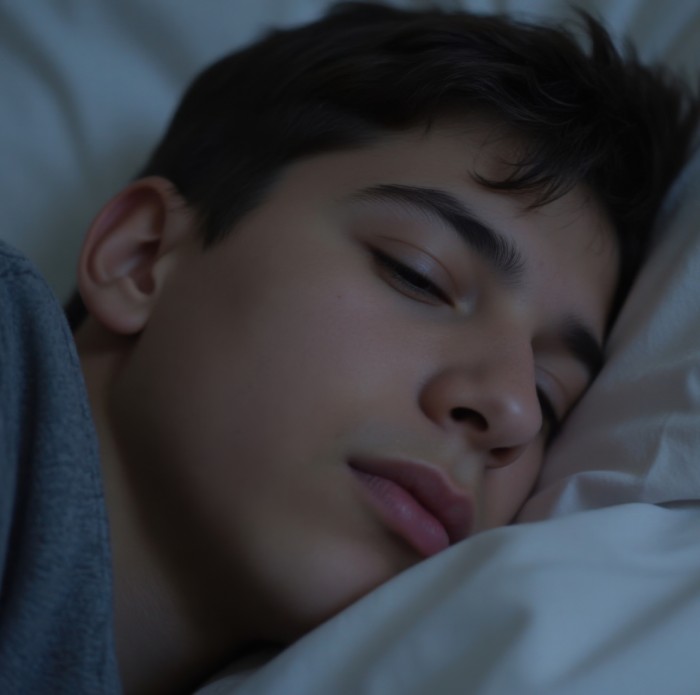Expert Sleep Help For Teenagers
Teen sleep struggles? You're not imagining it — this is the age group that gets the least sleep in the population.
During adolescence, sleep becomes more difficult — and it's not just because teens are staying up late on their phones. Biological changes, academic pressures, emotional ups and downs, and shifting social lives all collide at a time when teenagers actually need more sleep than ever.
Teens experience a natural shift in their body clock, meaning they don't feel sleepy until later at night — yet early school starts often force them out of bed before they're ready. Add in inconsistent routines, screen use, and mental health challenges, and it's no surprise so many teenagers are running on empty.

At Millpond, we understand that teenage sleep challenges are complex — and different from the sleep issues younger children face. That's why we listen carefully to both you and your teen, and create practical, respectful strategies that work around school, social lives, and growing independence. Because when teens understand their sleep, they're more empowered to make changes that stick.
Get Help
We're Trusted By The NHS & More
We are proud to be the largest provider of sleep training for the NHS since 2007, and the only private sleep clinic entrusted to deliver this service.






We train NHS health professionals across the UK
and have trained more than any other organisation since 2007!
Common Sleep Issues For Teenagers
Body Clock Changes and Sleep Timing
Delayed Sleep Phase
During adolescence, significant biological changes affect how and when teenagers feel sleepy. One of the most well-researched changes is a shift in the circadian rhythm, often referred to as delayed sleep phase. This shift is driven by later secretion of melatonin — the hormone that prepares the body for sleep — which means teens naturally begin to feel sleepy much later in the evening than they did as children.
As a result, many teenagers don't feel ready for bed until well after 10pm, or even into the early hours of the morning. This biological delay makes early school start times particularly difficult, often leading teens to wake while still in the deep stages of sleep — which can feel like dragging themselves out of bed in the middle of the night. The result is chronic sleep deprivation, reduced alertness, and increased mood and concentration difficulties during the day.
This can be even more pronounced in teens with an evening chronotype — those naturally inclined to be "night owls." These teens may have a stronger preference for staying up late and sleeping in, making it even harder to maintain a sleep schedule that fits with school demands.
Helping teenagers understand that these changes are biologically driven — not a sign of laziness or poor time management — is key. When teens learn how their body clock works and how to support it with practical strategies, they're more likely to engage with the sleep changes needed to feel better and function well.
Dr Michael Gradisar, a leading researcher in adolescent sleep, has shown that supporting teenagers with both education and structured changes to their sleep habits can significantly improve their sleep timing and quality. Recognising the biological roots of these changes is the first step in helping teens reclaim the rest they need.
Difficulty Falling Asleep or Staying Asleep
Even when they try to go to bed at a reasonable hour, many teenagers find it difficult to switch off and fall asleep. A combination of psychological and biological factors can make this challenging. The natural delay in their circadian rhythm means their brain simply isn't ready for sleep until much later, even if they're physically tired. Add to this the mental load of academic pressure, social concerns, and emotional ups and downs — and bedtime can become a time when worries start to race.
Screen use also plays a major role. Many teens use screens late into the evening, which not only stimulates and alerts the brain, but watching endless episodes of YouTube or Netflix series also shortens the time available for winding down before bed.
As a result, teens may spend long stretches tossing and turning, unable to relax enough to fall asleep. Some also experience disrupted sleep, waking up during the night and struggling to settle again. This fragmented sleep can leave them feeling groggy and unrefreshed in the morning — even if they've technically spent enough hours in bed. Over time, this pattern contributes to a growing sleep debt, which can impact everything from concentration and mood to physical health and academic performance.
Waking Up Tired and Exhausted
Many teenagers wake up in the morning feeling groggy, irritable, or completely unrefreshed — even if they've spent what seems like enough time in bed. This is often due to a mismatch between their internal body clock and external demands like early school start times. When teens are forced to wake during the early stages of their sleep cycle — particularly during deep (slow-wave) sleep — it can feel as though they're being woken in the middle of the night.
This phenomenon is known as "social jet lag" — the misalignment between a teen's natural sleep-wake cycle and the social schedules they're expected to follow. Research shows that many teenagers are chronically sleep-deprived during the school week, often trying to compensate by sleeping in on weekends. However, these catch-up sleep patterns can disrupt their circadian rhythm further and make weekday mornings even harder.
In some cases, the tiredness teens feel on waking isn't just due to insufficient sleep, but to poor quality sleep. Disrupted or fragmented sleep — whether caused by stress, anxiety, screen use, or conditions like restless leg syndrome — can reduce the amount of deep and REM sleep the brain receives, which are essential for memory consolidation, mood regulation, and learning.
Over time, this exhaustion can impact not only academic performance, but also mood, behaviour, and mental health. Many teens report feeling constantly tired, but don't know how to break the cycle — especially when they feel unable to fall asleep earlier. That's where understanding the science of sleep, and having the right support, can make all the difference.
Get HelpHabits and Environments That Disrupt Sleep
Poor Sleep Habits
Modern life makes it easy for poor sleep habits to become the norm, especially during adolescence. Many teens stay up late using phones, gaming, or scrolling through social media — activities that are mentally stimulating, and delay sleep.
Inconsistent bedtimes, irregular routines, and bringing devices into the bedroom all contribute to a disrupted sleep-wake cycle. Even seemingly harmless habits like watching TV in bed or doing homework right up until lights out can make it harder for the brain to switch off and transition into restful sleep.
It's also common for teens to sleep in much later on weekends in an attempt to "catch up" on lost sleep from the school week. While this may offer short-term relief, it disrupts their circadian rhythm further and can make falling asleep on Sunday night — and waking early on Monday morning — even more difficult.
Establishing regular, screen-free wind-down routines is key to supporting a teen's natural sleep process and encouraging more consistent, restorative rest.
Bed Swapping
Although it's often assumed that older children and teenagers sleep independently, it's not uncommon for teens to continue seeking out a parent's bed — or request their parent to stay in theirs — particularly during periods of emotional stress. These behaviours often stem from anxiety, difficulty settling, or a need for reassurance.
While occasional co-sleeping may feel like a short-term comfort, when it becomes a regular routine, it can interfere with both the teens and the parent's sleep quality. Teens may begin to associate falling asleep with a parent's presence, making it harder for them to settle independently or feel confident sleeping alone.
Addressing the underlying cause — whether it's stress, fear, or habit — and supporting the teen to build confidence in their own sleep space can help break the cycle gently and respectfully.
Get HelpMental and Physical Factors Affecting Sleep
Sleep Anxiety
Sleep anxiety is increasingly common in teenagers. They may worry about not falling asleep quickly enough, about getting "enough" sleep, or about how tired they'll feel the next day. Ironically, this anxiety can make it even harder to relax and fall asleep, leading to a frustrating cycle of tension and sleep loss.
This pattern can be intensified by monitoring devices or simply checking the clock through the night, reinforcing the sense of pressure around sleep.
Supporting young people to understand how sleep works — and that some fluctuation is normal — can help ease this anxiety. Cognitive behavioural strategies, relaxation techniques, and breaking the habit of clock-watching can be particularly helpful.
Stress and Emotional Upset
The teenage years are filled with emotional highs and lows. Exam stress, friendship issues, performance pressure, and body image concerns are just a few of the stressors that can dominate a young person's thoughts — especially at night when there are no distractions.
Racing thoughts, replaying conversations, or worrying about the next day can all delay sleep onset. Emotional upsets during the day can also lead to night-time waking or difficulty settling after waking. In some cases, underlying anxiety or low mood may also contribute to disturbed sleep patterns.
Helping young people develop calming bedtime routines, teaching emotional regulation strategies, and creating space to talk through worries earlier in the evening can support better rest and reduce night-time stress.
Restless Leg Syndrome (RLS)
Restless Leg Syndrome is a neurological condition that can affect teenagers, particularly during growth spurts or periods of stress. It causes an uncomfortable sensation in the legs — often described as tingling, crawling, or itching — that creates a strong urge to move them. These sensations typically worsen at night and during periods of rest.
RLS can significantly disrupt the ability to fall asleep and may be mistaken for behavioural sleep resistance. It is sometimes linked to low iron levels, so medical advice and possible blood tests may be needed.
If a teen is complaining of "fidgety" legs or constantly shifting around at bedtime, RLS may be worth investigating. Addressing underlying causes and developing sleep-supportive routines can help manage the condition.
Snoring or Sleep Apnoea
Loud snoring, gasping for breath, or noticeable pauses in breathing during sleep may be signs of obstructive sleep apnoea (OSA), a condition where the airway temporarily narrows or becomes blocked during sleep. While often associated with adults, sleep apnoea can also occur in young people and is sometimes overlooked.
Teens with OSA may appear to get a full night's sleep but still wake up tired, experience headaches, mood changes, or struggle with concentration and memory. Risk factors can include enlarged tonsils, and obesity.
If you notice these signs, it's important to speak to your GP, as untreated sleep apnoea can significantly impact a teen's health, learning, and emotional wellbeing.
Get HelpWe Can Help!
Teenage sleep challenges are real — and they're more common than you might think.
At Millpond, we understand that teenage sleep is different. The teenage brain, body, and lifestyle all demand a more nuanced approach to sleep support — one that considers both biological changes and the pressures of modern life. That's why we take the time to listen carefully, not just to you as a parent, but to your teenager themselves.
We know that standard sleep advice often doesn't fit teenage reality. That's why we create practical, flexible sleep plans that take into account school schedules, social lives, screens, hormones, and stress. We help teens build sustainable, science-backed sleep habits — not just quick fixes.
From managing delayed sleep phase and reducing screen time to calming anxiety and navigating bedtime routines, we'll guide your family through every step. We help teens understand the biology of their sleep so they feel more in control, less frustrated, and empowered to make positive choices that stick.
Whether your teen is lying awake at night, struggling to get out of bed in the morning, or exhausted despite spending hours in bed — we can help. With expert advice, compassionate support, and over 30 years of experience, we'll work with you to get your teen's sleep back on track — so they can thrive at school, in friendships, and in life.
Contact Us Today
Simply fill in our contact form below or call us on 020 8444 0040
and we'll be in touch to discuss your needs.
